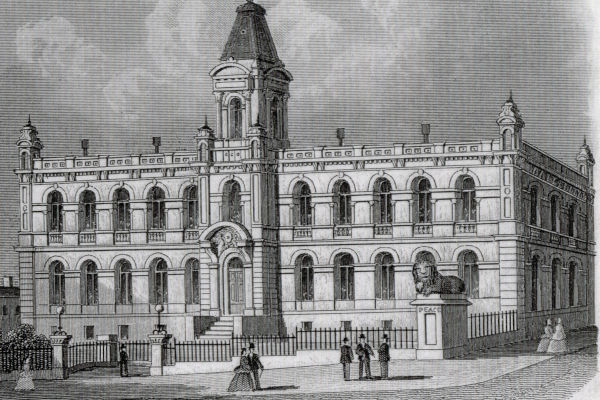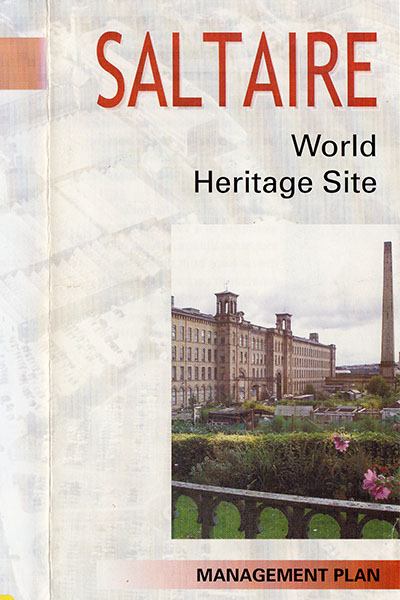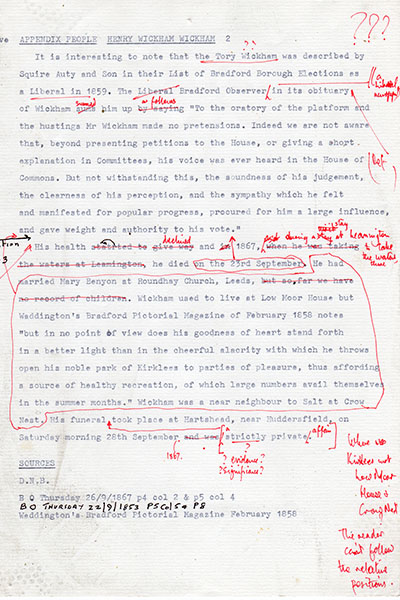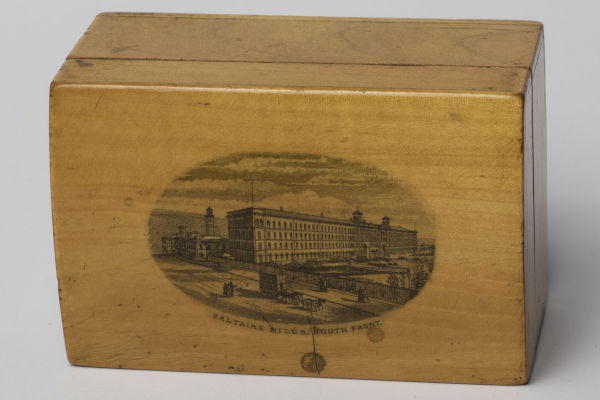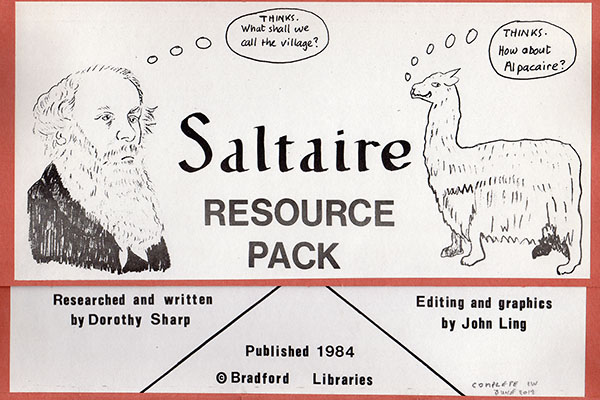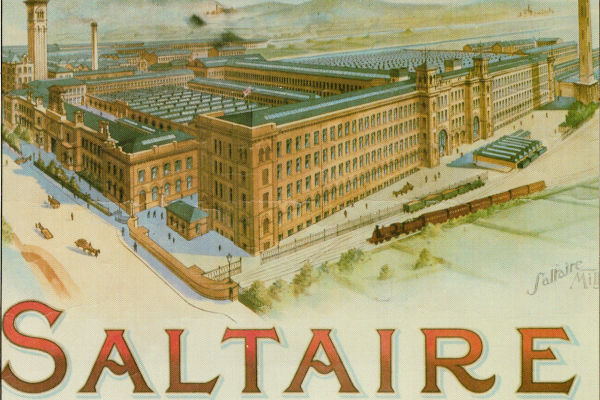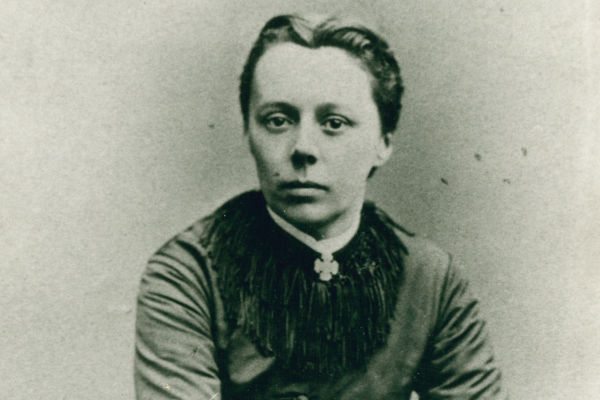Bookseller, historian, campaigner
Clive Woods came to Saltaire in 1986 and became entranced with Sir Titus Salt’s model village. Over the next 20 years, he became the village historian.
He was also a ceaseless campaigner for the preservation of Saltaire, opposing plans for a main road to be built through the village. Most importantly, Clive played a key role in Saltaire becoming a UNESCO World Heritage Site, the only one in West Yorkshire.
Early life and education
Most people in Saltaire at the turn of the twenty first century knew Clive Woods, with his ruddy complexion, bushy beard, ready smile and friendly (rather eccentric) manner. His knowledge of the history of Saltaire was second to none and he prided himself on the researched accuracy of his information.
He was best known as the ‘Village historian’, but it is not clear just how many people were aware, for instance, that he was a Lancastrian whose teaching career had spanned education in Lancaster, Jamaica, Birmingham and Leeds.
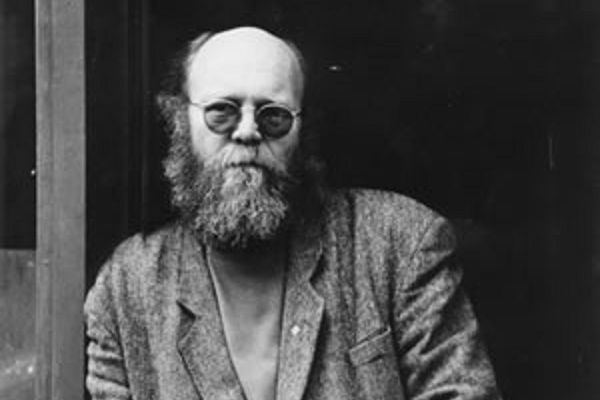
The long journey to Saltaire
His journey to Saltaire had been a surprising one, from the Mining and Technical College in Wigan to Lancaster University; to Kingston, Jamaica on a ‘Study and Serve’ scheme; back to this country and Saltaire via Birmingham.
His travels had always been determined more by chance than by planning: had he not been inspired by Joe Hilton, a Catholic priest who was also an enthusiastic historian, he would never have done a History degree; without which he would never have found himself the only male teacher at St. Andrew’s High School for Girls in Jamaica. Had he not had a good friend in Larry Anderson, an educational psychologist from Bradford, he would not have been drawn to this area.
Finally, it was a chance remark by a Doctor Parker in Leeds that led him to look at the impact that Titus Salt had had on the occupational diseases of the nineteenth century.
Clive left teaching to become a bookshop owner and researcher in Saltaire in 1986. Funding came from the royalties on his ‘Guide to Saltaire’; from guided walks around the Village and from two years hard work as caretaker of Victoria Hall.
Campaigning for Saltaire's heritage
Clive made a huge impact on Saltaire during the public inquiries into the Aire Valley Road Scheme in the 1980s, when it was proposed to build a trunk road through the Village. Clive was an important figure in the campaign against this.
He helped to establish Saltaire Village Society (he was the first Chair) and was part of the group which had Saltaire listed by English Heritage and got the Town Scheme adopted. These measures culminated in stopping the desecration of the Village and in gaining World Heritage Status for Saltaire.
His dream was realised in 2001, when the United National Educational, Scientific and Cultural Organisation (UNESCO) gave the site approval following a campaign backed by Saltaire Village Society, local traders, Shipley MP Chris Leslie and Bradford Council. The decision was hailed the most important for Saltaire since the industrialist Sir Titus Salt decided to establish his purpose-built model mill village more than 150 years before.
Later years and legacy
In May 2001 Clive suffered a stroke while working at Victoria Hall. He lost his speech and the use of an arm and one of his legs was seriously weakened. Although he recovered, his illness weakened him considerably.
When asked about the consequences of his stroke he did not describe the symptoms which continued to plague him, ever the professional historian, he answered: ‘A year’s lost research’. The three most important qualities in a local historian, according to Clive, are: curiosity; refusal to accept received opinion; readiness to go anywhere to find a new fact. In his case, one could add the tenacity of a terrier to this list.
Clive died in 2007. Among the many tributes paid to him was the following from Councillor Anne Hawkesworth, who was Bradford Council’s executive member for environment and culture. She said:
He had the vision to make Saltaire become a World Heritage Site and we need more people like him who have a passion and pride in where they live. A World Heritage Centre is very important to Bradford, there aren’t many around Britain.
Author: Roger Clarke. Originally published in the Saltaire Sentinel, January 2007.
The Clive Woods Collection
Clive’s wide-ranging collection of photographs, postcards, books and booklets, documents, and lots more, is now part of the Saltaire Collection.
View an introduction to the Clive Woods Collection, from where you can search and browse this eclectic but fascinating set of items about Saltaire, including items from the 1887 Royal Yorkshire Jubilee Exhibition, and other items pictured on this page.
You may also be interested in
Explore the Clive Woods Collection
Search and browse items from the Clive Woods Collection
Dorothy Sharp
Read a biography of Dorothy Sharp, local librarian, educator, researcher and key figure in founding the Saltaire Collection
Foundation of Saltaire
Find out how and why Sir Titus Salt built Salts Mill and his model village of Saltaire
More biographies
Discover the life stories of some of the people who built, worked in, lived in, and saved Saltaire.
